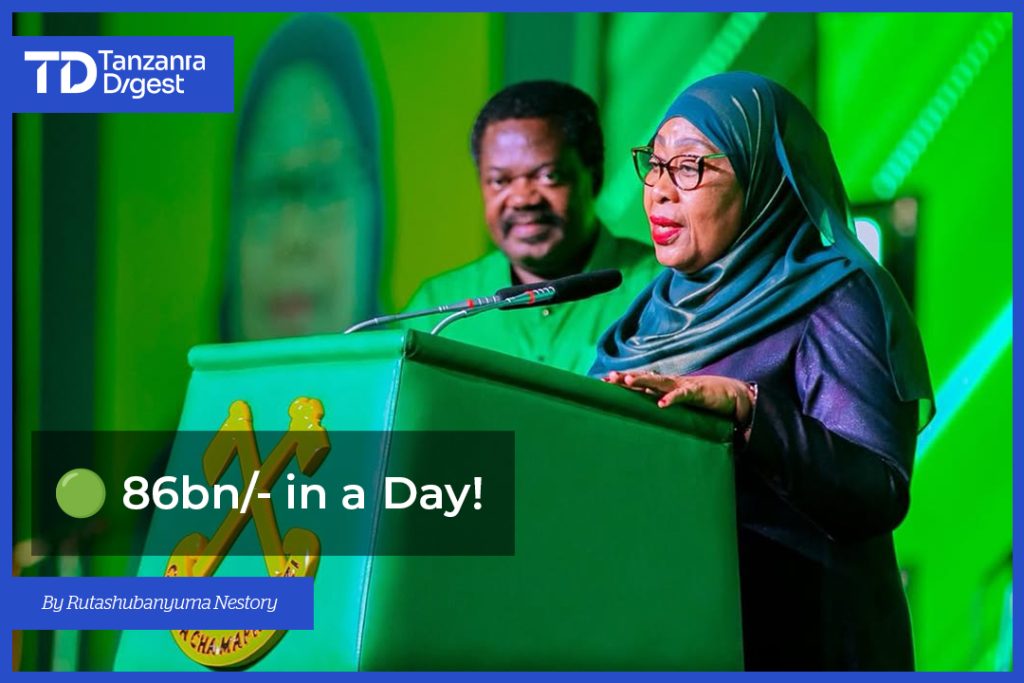The CCM’s recent “Sh86.31 billion” fundraising achievement, which brings it close to its Sh100 billion target in just one day, illustrates the deep integration of business and government in Tanzania.
This event, held on August 12, 2025, at Mlimani City Hall under President Samia Suluhu Hassan’s leadership, reveals a symbiotic ecosystem where economic elites and public institutions collaborate to advance mutual interests. Below is a detailed analysis of this dynamic:
Tanzania’s Power Nexus: CCM’s 86bn/- Fundraiser Spotlights Deep Business-Government Ties.
Fundraising Mechanics: Business as a Strategic Partner.
Substantial Contributions
Small-scale miners: Donated Sh16 billion.
Kariakoo traders: Contributed Sh500 million.
Corporate entities: GSM, through Yanga FC President Engineer Hersi Said, contributed Sh10 billion with an additional Sh100 million pledged by the club, while businessman Haider Gulamali donated Sh300 million via Africarriers, GulamaliGroup, and associates.
Government elites: Vice President Philip Mpango, Prime Minister Kassim Majaliwa, and Speaker Tulia Ackson each contributed Sh20 million, while President Samia personally donated Sh100 million.
Pledges vs. Cash:
Sh56.3 billion collected immediately; “Sh30.02 billion” in pledges, indicating trust in future commitments.
Reciprocity: Policy Access in Exchange for Support.
CCM’s economic policies directly benefit donor groups, creating a cycle of mutual reinforcement:
Private Sector Incentives: The 2025/26 budget eliminated licensing fees for manufacturers and importers, reducing operational costs.
Agricultural Support: Expansion of irrigation (from 681,383 to 983,466 hectares, 2020–2024) boosts agribusiness productivity.
Blue Economy Focus: 300,000 jobs targeted by 2030 in sectors like fishing and logistics, aligning with corporate interests in maritime resources.
Regulatory Leverage: Business Under State Oversight.
While businesses gain access, the state retains control:
Donor Vetting: CCM rejects funds that “undermine Tanzanian dignity,” ensuring alignment with national interests.
Tax Policies: Efforts to increase SME tax contributions (currently 20% of GDP vs. 95% business share) signal tighter revenue mobilization.
Infrastructure Projects: SGR railways (e.g., Mwanza–Isaka, 341 km) and Bagamoyo Port prioritize business connectivity, funded partly by public-private partnerships.
Institutionalized Channels for Collaboration.
Digital Membership: 13.19 million registered CCM members enable streamlined engagement between businesses and party structures.
Manifesto Alignment: CCM’s 2025 plan emphasizes private investment in manufacturing and tech, mirroring donor priorities.
Grassroots Mobilization: President Samia highlighted neighborhood donations for her nomination forms, showcasing localized business-government ties.
Implications: Power Concentration and Accountability Gaps.
Election Advantage: Funds fuel campaigns (materials, rallies), and disadvantage opposition parties.
Elite Capture: Major donors (e.g., Gulamali, Hersi Said) gain informal policy influence.
Transparency Risks: Despite pledges to avoid “auctions,” the scale of donations raises questions about post-election favors.
Conclusion: CCM’s 86bn/- One-Day Haul: Where Tanzanian Business Meets the Seat of Power.
The CCM’s Sh86.31 billion haul epitomizes Tanzania’s governance model: “business elites fund state power”, while the state reciprocates with policy access and infrastructure.
This system fuels development (e.g., GDP growth, job targets) but risks entrenching inequality and reducing public accountability. As the October 2025 election approaches, this synergy will define both economic trajectories and democratic resilience.

